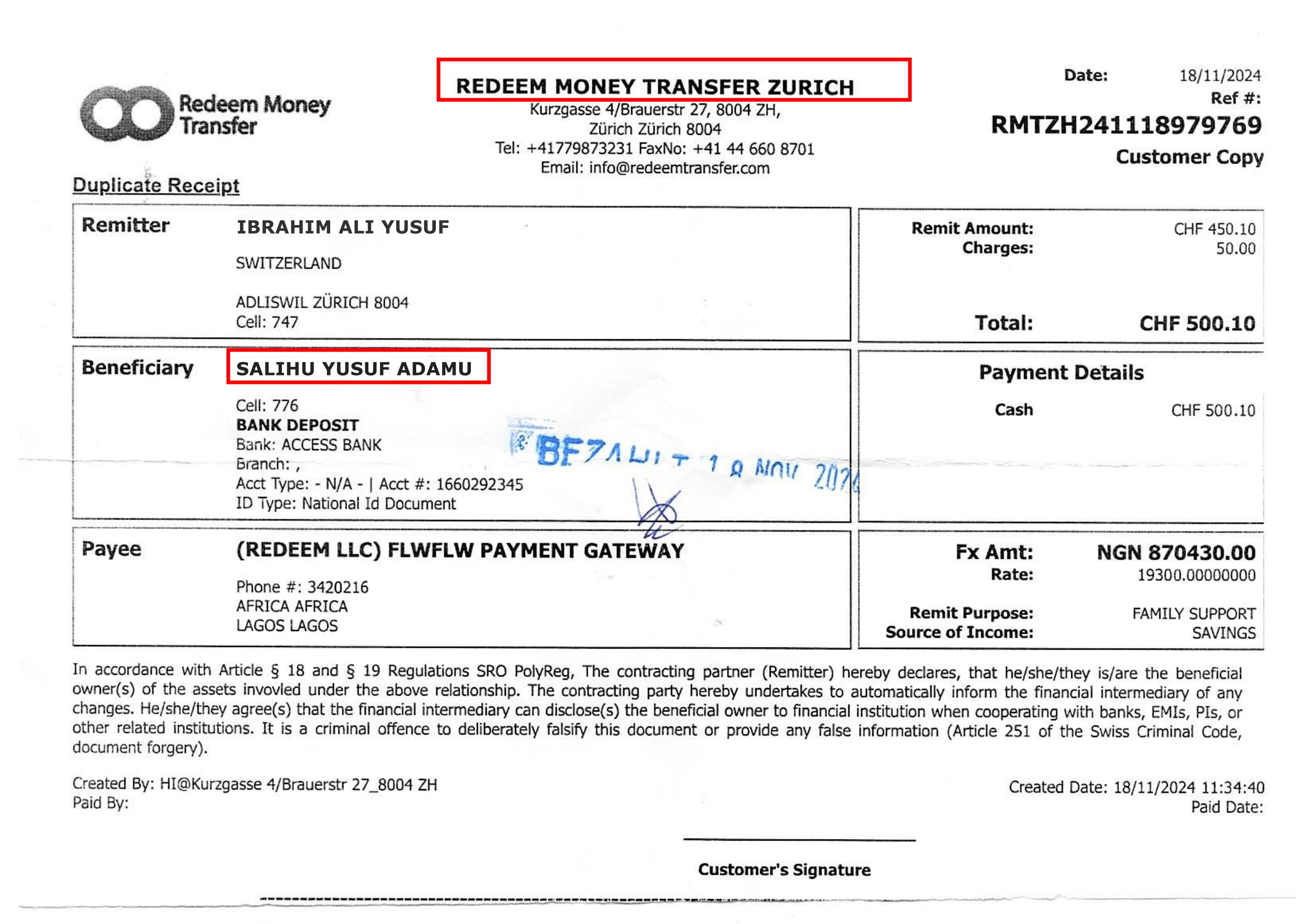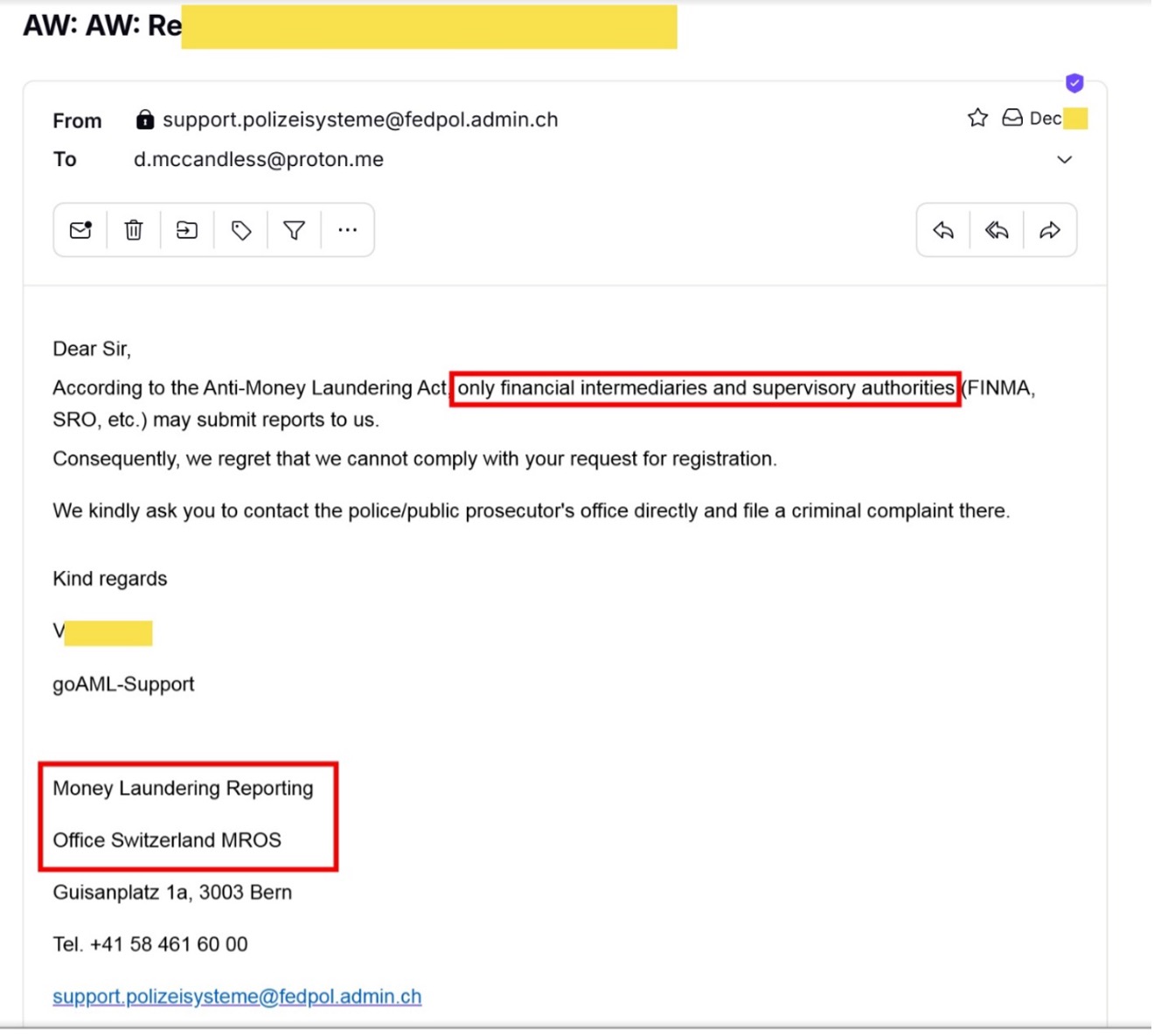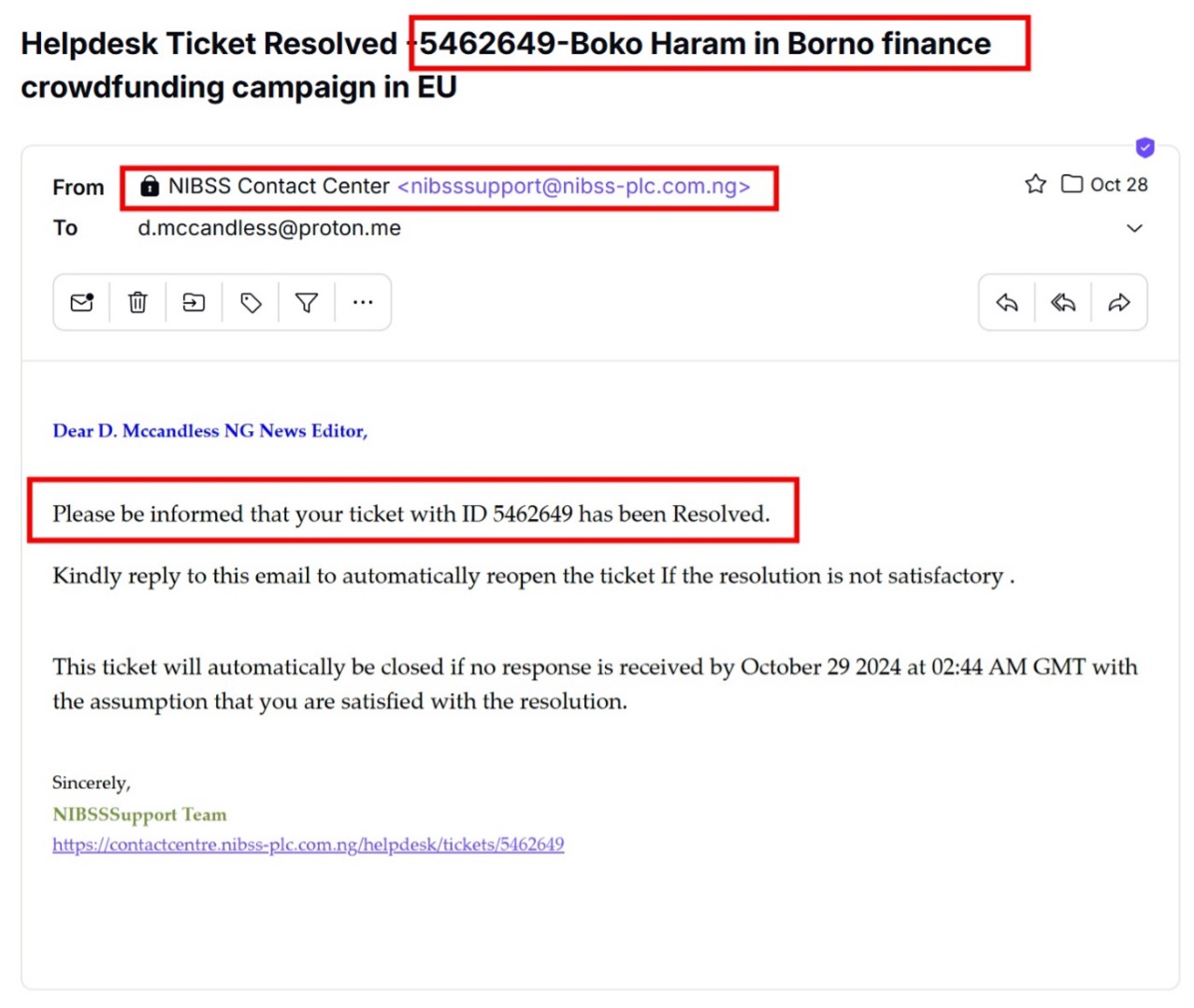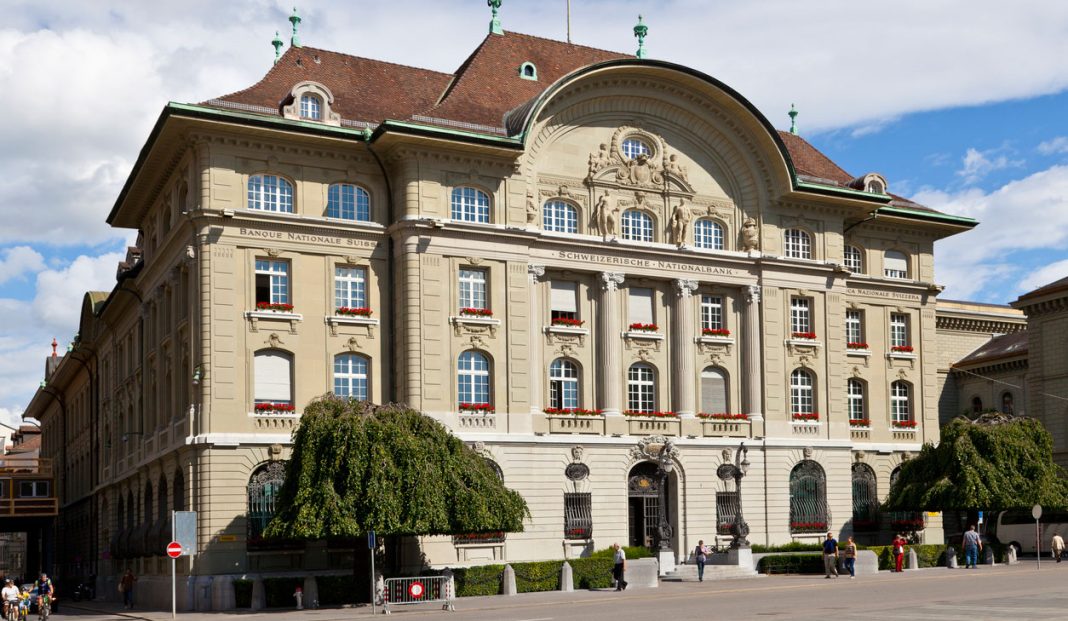LONDON, UK – For decades, Switzerland has epitomised precision and trust in global finance, cementing its reputation as a haven of economic stability. Yet, beneath its pristine surface lies a darker story, one of unchecked shadow networks exploiting its renowned financial system to fuel terrorism.
Recent investigations reveal that the same mechanisms which have made Switzerland a global leader in finance are being manipulated to fund extremist groups like Boko Haram, the Nigerian insurgency infamous for the 2019 kidnapping of 257 schoolgirls in Borno State.
This discovery shines a troubling light on a global issue: the intersection of advanced financial systems and the murky business of terror funding.
The Platform That Funded Violence

In October 2024, our investigative team uncovered a startling reality — a European crowdfunding platform brazenly enabling financial support for Boko Haram.
The website freedom2borno dot com, encouraged donors to fund guerrilla activities through modern payment systems.
Contributors could finance drones, tactical vests, and, chillingly, bombs, which they could “sign” and boast about on social media.
By December 2024, following relentless advocacy and a formal complaint to Google, the platform was taken offline.
However, the underlying issue persists: robust legal-seeming payment channels in the EU and UK remain fertile ground for illicit activities.

The Hidden Currents of Illegal Transfers
The global trade in illicit goods thrives on hidden mechanisms that exploit vulnerabilities in interconnected financial systems.
This shadow economy feeds on unregulated transactions, revealing how deeply it infiltrates global money flow.
According to World Bank data, personal remittances sent to Nigeria from abroad reached a staggering $20.5 billion in 2023. For millions of families, these remittances serve as a vital lifeline. However, closer scrutiny exposes a troubling discrepancy.
Domestic remittances within Nigeria amounted to just $84.1 million in the same year. This stark gap raises a critical question: where is the rest of the money going?

The evidence points to the existence of alternative, unauthorised channels that bypass regulatory oversight.
These hidden pathways not only facilitate the movement of funds for illegal activities but also serve to strengthen extremist groups like Boko Haram.
Our investigation reveals the disturbing role these covert systems play in sustaining global networks of terrorism financing.
Financial Darknet Deals and Physical Agents
A deeper probe into the mechanisms reveals an alarming combination of Darknet channels and physical agents facilitating illicit transactions.
The Darknet’s “Money Transfers” section thrives on anonymity, requiring no identification or origin disclosures.
In one test, we posed as a factory worker in Switzerland, requesting a $100 transfer to a known Boko Haram affiliate listed on the U.S. Specially Designated Nationals list.

The response was swift: “Any name is fine. Just pay us in cryptocurrency.” The payment wallet? Iron Wallet, a platform previously promoted by Freedom2Borno.
Physical agents proved no less effective. At a Zurich shop linked to illicit activities, an operative conducted a seamless cash transfer using a password scribbled on an envelope.
Despite regulatory frameworks, these shadowy operations continue unchecked.
A Financial Ecosystem in Question
Our investigation traced a network of entities exploiting financial systems across Switzerland, the UK, and other EU nations:
- Glo Currency UK Limited
Central to the operation, this entity’s Swiss subsidiary, Glo Currency Travel and Tours GmbH, is already under scrutiny by Switzerland’s financial regulator, FINMA. Customers reportedly hand over unrecorded cash in envelopes, bypassing official channels. - Redeem GmbH
Acting as an agent for Glo Currency, this firm’s transactions raise concerns of regulatory circumvention. Investigations suggest a façade of legitimate operations hides extensive Nigeria-bound cashflows. - Cash Xpress Financial Services SARL
Using dual systems, this entity channels some funds officially while others flow through informal methods. Evidence links it to Boko Haram donations funnelled via Change Leman in Geneva. - Change Leman
Operating from Geneva, this French-registered entity appears to lack proper Swiss licensing. Allegations of involvement in drug trafficking bolster suspicions about its dual roles in cash handling and logistics. - Direct Links to Boko Haram
Investigations have unearthed documented transactions flagged by the Nigerian Financial Intelligence Unit (NFIU) that tie financial operations in Switzerland to the funding of Boko Haram. These findings are bolstered by evidence suggesting that these covert networks are also financing other illicit activities, including drug trafficking and human organ trading. 
Key Entities Involved: - Glo Currency UK Limited
Operated by Olatunji Akinwumi Oyebanji.
- Redeem GmbH / Redeem Money Transfer
Managed by Franklin Ogechukwu Ndupu.
- Cash Xpress Financial Services SARL
Directed by Aurélien Mophou Tchapdjo and Léa Ernestine Mophou Tchapdjo.
These entities are implicated in the movement of funds through shadow networks, enabling the sustenance of extremist activities and perpetuating criminal enterprises. - Glo Currency UK Limited
From Swiss Precision to Nigerian Inertia: A Frustrating Dead End
The European Union’s bureaucratic hurdles are a well-documented frustration, often bogging down even the most urgent investigations.
Yet, encountering similar inefficiencies in Switzerland—a nation celebrated for its precision and reliability—was both unexpected and disheartening.
As part of our investigation, we reached out to prominent Swiss financial oversight bodies, including FINMA and POLYREG, to seek their input before publishing our findings.
Unfortunately, their response was far from reassuring. Citing bureaucratic constraints, we were informed that our complaint could not even be officially registered because, in their words, “we are not Swiss legal entities.”

This revelation underscores a troubling lack of accessibility in Switzerland’s regulatory systems, allowing such covert operations to persist under the radar.
Undeterred, we turned our focus to Nigeria, hoping for a more responsive and transparent process. That hope was quickly dashed.
Our attempts to engage the Nigerian Financial Intelligence Unit (NFIU) and the Central Bank of Nigeria came to an abrupt halt.
Without any explanation, the complaint we filed was closed prematurely. Subsequent follow-ups were met with silence, leaving us without answers or recourse.
The explanation, while disheartening, seems clear: corruption.

It appears that certain officials in Nigeria have little motivation to disrupt a lucrative system of unregulated money flows between the EU and Nigeria.
These channels, operating in the shadows, not only fuel terrorist organisations like Boko Haram but also benefit individuals who profit from this illicit trade.
At the same time, our investigation reveals that Switzerland’s financial systems may also be unknowingly facilitating these operations.
For a country renowned for its transparency and financial oversight, this poses serious questions about systemic vulnerabilities and oversight failures.
A Call for Accountability
The reality of shadow networks funding extremist activities cannot be ignored. Switzerland’s reputation as a financial powerhouse faces a moral reckoning.
Shadow networks not only exploit its systems but also undermine its commitment to transparency.
In Nigeria, the silence of regulators points to a darker truth—one where corruption allows illicit cashflows to sustain insurgencies.
This exposé reveals the urgent need for international collaboration and reform.
Terror funding must not be allowed to thrive under the guise of legitimate financial systems.
For the families torn apart by acts of terror, including our own colleague who lost a loved one to Boko Haram, the fight for accountability continues.
Our investigation presses on, and more revelations are on the horizon. Stay tuned.
Contributions by David McCandless, Journalist and Senior Investigator, NG News, London, UK







